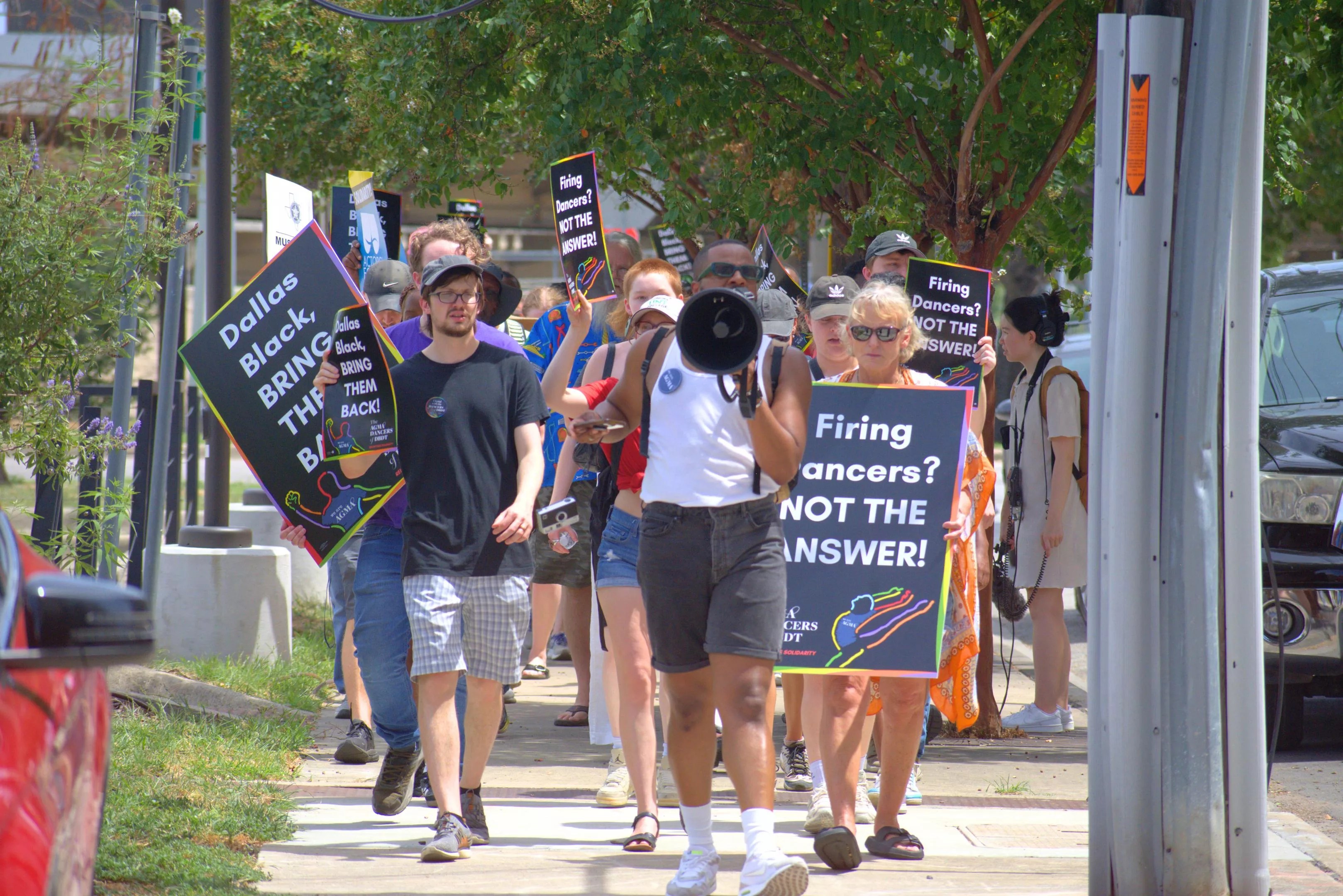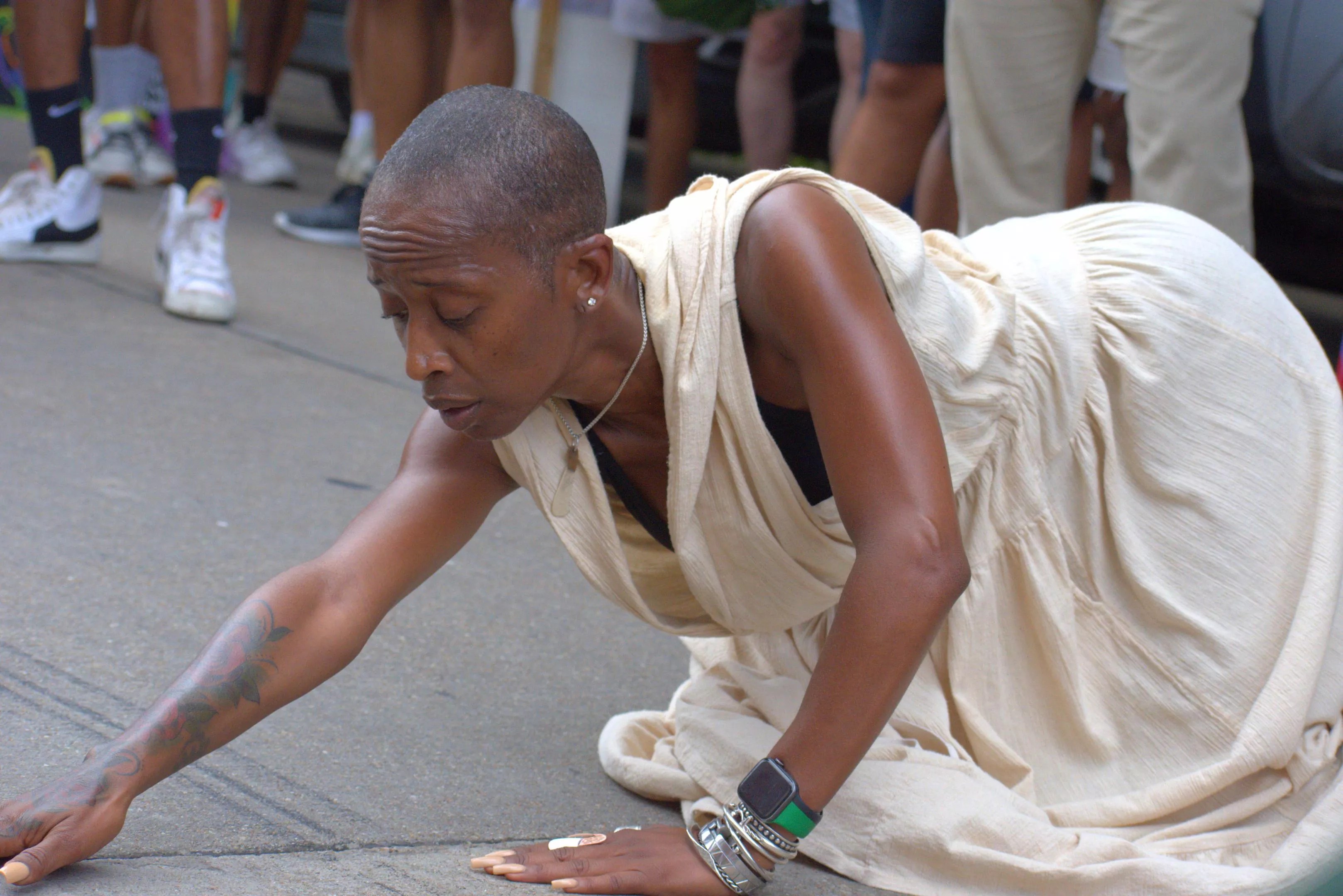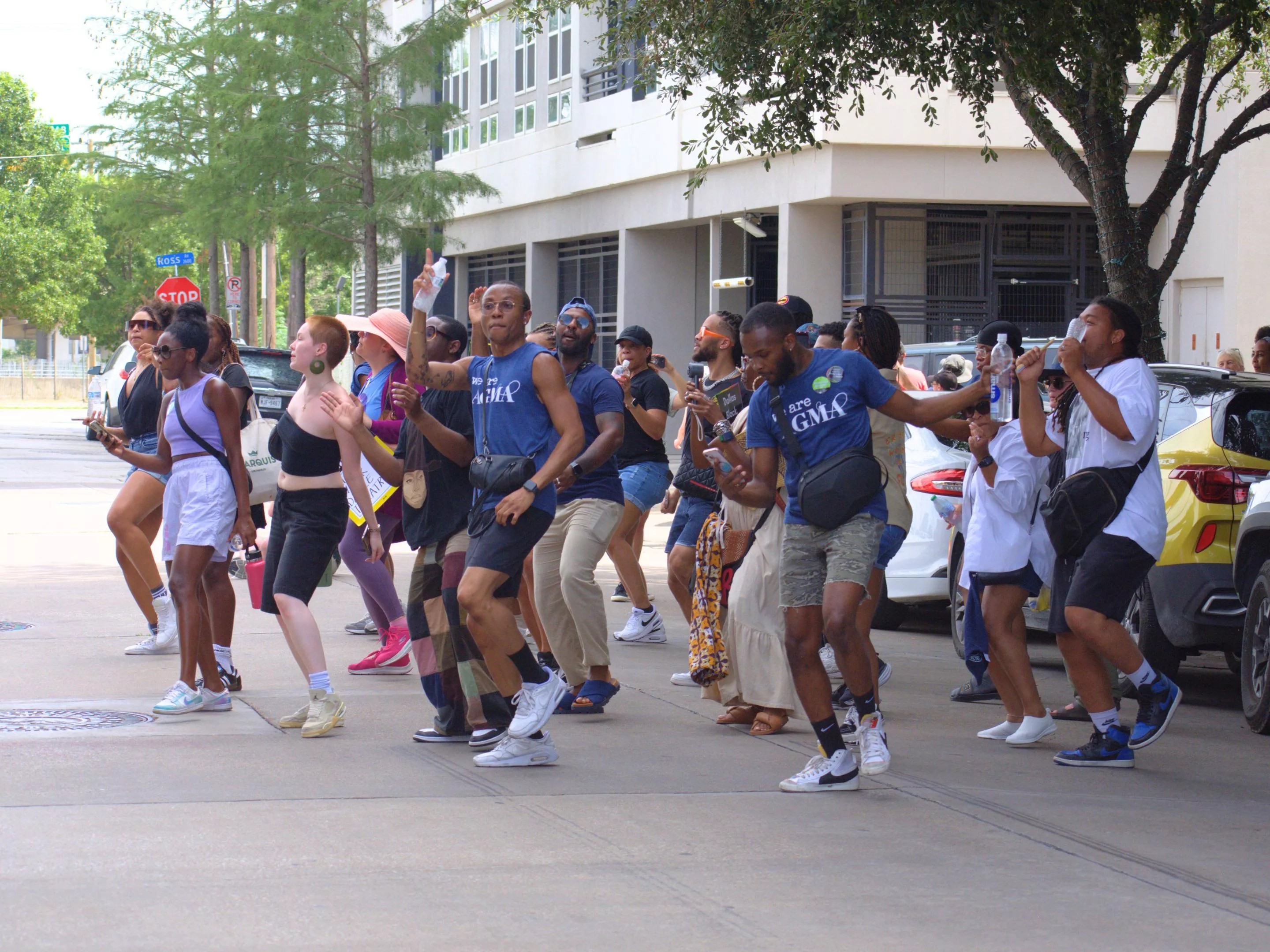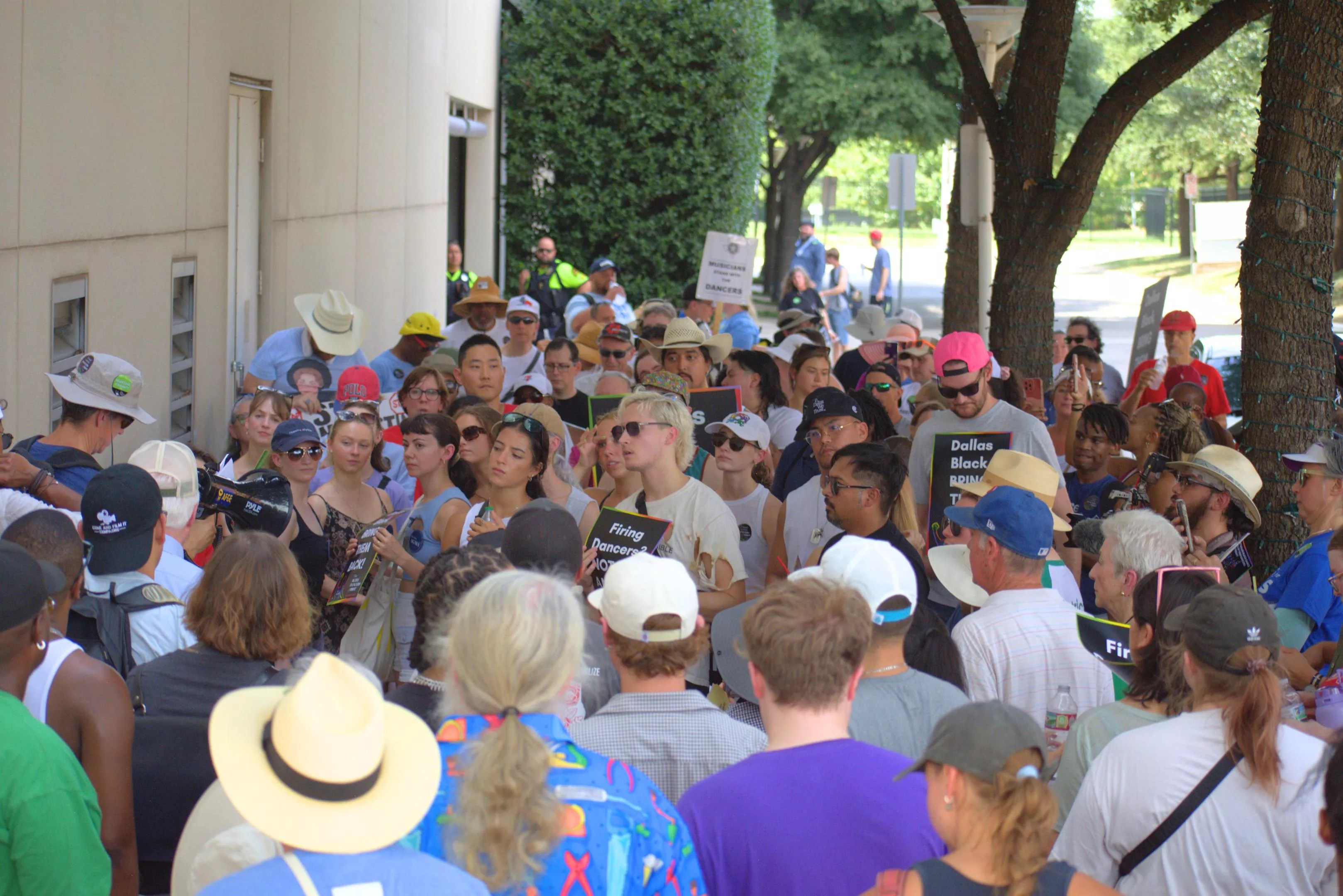
Vanessa Quilantan

Audio By Carbonatix
More than 100 performers and supporters gathered on the afternoon of Aug. 17 in 103-degree heat to form a picket line across the entrance to the Dallas Black Dance Theatre. With sweat sopping their brows, participants marched together, hoisting protest signs that bore the same words of their echoing chants, “Dallas Black, BRING THEM BACK!” and “Firing dancers? NOT THE ANSWER!”.
As the traffic on Arts Plaza died down between Ross Avenue and Ann Williams Way (named for the Dallas Black Dance Theatre’s esteemed founder), the performers there fighting for their livelihood began dancing in the street to the hand-pounded rhythm of a single djembe drum. The dancers of DBDT leaped and whirled in a frenetic gyre over the sizzling pavement, engaging their mastery of movement as a universal language to the keepers of a stage from which they say they’ve been bulldozed.
“When you are obedient in your struggle,” a woman bellowed through a megaphone as her flowing skirt swayed with every shake of her clenched fist, “when you are obedient in your resilience, there is no way that every single person who is present doesn’t understand the true unification of humanity!”
The swarm of protesters gathered to combat what they say is injustice. Dallas Black Dance Theatre recently fired the entire troupe of main company performers, and dancers allege it was retaliation for their establishment of a worker’s union under the American Guild of Musical Artists (AGMA).
“This truly is unprecedented for an arts organization – an ostensibly progressive, forward-thinking, pro-worker, pro-artist organization – to take this kind of action,” AGMA’s National Organizing Director Griff Braun tells the Observer. “This is a largely unionized industry at the highest levels of professional dance and opera. So, we always feel like it’s a badge of honor if artists unionize; it elevates the stature of a company tremendously.”
“So this,” Braun presses, “this is not normal.”
But as the Dallas Black Dance Theatre tells it, the mass firings have nothing to do with recent unionization activity. Leadership insists that eliminating their entire leading company in one fell swoop was a justified response to the level of “unprofessionalism” exhibited in a video posted to the unofficially affiliated dancer-run Instagram account, @dancersofdbdt.
The video was posted by dancers on June 21. It depicts the performers in-studio at Dallas Black Dance Theatre, cutting-up between rehearsals under the caption, “MEET THE DANCERS.” Soundtracked to the theme song from the early-’90s primetime sitcom Family Matters, the video presents each company member on-screen through various pseudo-candid activities as they smile at the camera, in the style of a cheesy TV show’s opening credits sequence.
Company performer Nile Ruff lifts a fellow dancer like a human dumbbell. Hana Delong mimes punches to a flopping colleague’s gut in the flamboyant style of clowns performing for a child’s birthday party. Derrick McKoy Jr. narrowly squeezes between two walls sporting a mischievous caught-in-the-act grin. It’s the kind of cutesy social media fodder we’ve all become accustomed to in the age of TikTok. But James Fuller, founder of Arena Communications and spokesman for Dallas Black Dance Theatre, says the organization was not amused.
“These are terminable offenses. There’s no second chance. And there were several things in that video they did that were against the code of conduct,” Fuller says. “So the things that happened in the video … you may not see it as a big deal. But when you look at the role that the dance company here is trying to play, especially recognizing that this is an African American community, we have to hold ourselves to a higher level of standards because we really want these dancers to be seen as just as good, just as professional, just as prepared, and just as good of a role model as any other person out there, no matter what their color.”
The implication that these standards of respectability politics in the Black community should apply to employees – and the message coming from Fuller, who’s white – doesn’t surprise recently terminated dancer Elijah W. Lancaster.
“For me, that resonates in a hard way because it’s just like, [Dallas Black Dance Theatre] wants us to be perfect. We are not perfect,” Lancaster says. “And [they] also grew this company in a time where … you had to conform to what I would say is a standard of whiteness.
“So [we] have to look a certain way, because they’re trying to appeal to the more conservative white donors and sponsors.”
Even with these questionable standards of professionalism, Dallas Black Dance Theatre’s reasoning for the mass termination still doesn’t add up to the troupe. Despite the video being posted to Instagram on June 21 (and initially to a dancers’ TikTok account in 2023), the DBDT distributed signed letters of intent establishing employment for the upcoming season to these same company dancers one week later. The firing sweep began to take place on Aug. 9, seven weeks after the video was posted to the @dancersofdbdt page.
In a statement sent to the Observer via Fuller, Dallas Black Dance Theatre said, “The video has damaged DBDT’s public image and jeopardized our relationships with donors and community partners. (…) This negative impact has already affected our fundraising, national touring, and other critical opportunities.”
Fuller could not confirm whether DBDT has lost any donors, community partners or touring performance bookings as a direct result of the video.
The full story of this controversy surrounding Dallas Black Dance Theatre starts in the early months of this spring, when dancers in the main company decided that their working conditions had become untenable.
“Some of the major things [were] definitely the salary and the per diem.” says dancer Terrell Rogers Jr. “In order to survive, each of us work multiple jobs in the evenings every single day just to pay our bills. And when we’d go on tour, which is pretty often at DBDT, we were unable to make that supplemental income.
“Our per diem varies depending on whether or not we’re out of state, in state or international, but it’s never enough to offset the amount of money that we’re losing when we go on tour.”
Lancaster says he earned more in a second-tier company at The Alvin Ailey American Dance Theater in New York City before signing to the main troupe at Dallas Black Dance Theatre.
“We were getting paid just enough to barely cover our rent as well as health insurance that we couldn’t even afford the copays for,” he says. “Because at the end of the day, we had no money. We had to figure out if you wanna eat, pay rent, pay your bills, or go to the doctor… you could never do it all in one week. And I think for us as artists, knowing how much we have to put in, knowing how much they expect from us and how much we want to give, it’s just physically impossible knowing that we can’t even keep our bodies healthy and safe.”

The pavement sizzled under the scorching sun at the Dallas Black Dance Theatre’s picket line.
Vanessa Quilantan
A dancer’s body is their livelihood. And even though Dallas Black Dance Theatre offers in-house physical therapy, the dancers say there are multiple conditions attached to that workplace benefit. DBDT’s company of 14 dancers were allotted only five 30-minute physical therapy appointment slots every other week, on a first-come-first-serve basis. Even more concerning, the therapy offered is solely preventive and is not intended to treat injuries.
“It’s not that [the provided physical therapist] is ill-equipped to help us; it’s just not in the contract for her to be able to do that much for us,” Rogers says. “The repertoire that we do at Dallas Black Dance Theater is extremely athletic. We dance five days a week, Monday through Friday. And we perform on the weekends a lot of times. So our bodies take a lot of wear and tear, just like athletes do. Even to be able to meet Dallas Black’s own mission statement of ‘relentless excellence,’ we can’t do that if our bodies are hurting and we can barely stand up some days.”
The dancers say they were subjected to degrading cultural standards at DBDT that policed their gender presentation and hairstyles.
“This company is predominantly young, there are different personalities and different ways they identify. So there are different pronouns we use and people have piercings and tattoos,” Lancaster says. “And we all came into the building with these things. And we are not allowed to show these on stage or any Dallas Black Dance Theater-affiliated gala, rehearsal, meeting, in the studio, in the airport or anywhere.
“And on top of that, being a Black dance company, we have all these different types of hair textures – braids, locks, everything. But we are not allowed to wear durags or scarves … and that means backstage before the show, even though we have to lay down our edges and make sure that everything looks proper, which in the handbook says, if we do not look presentable then we could potentially be fired.”

Dancing in the streets rings louder than you’d think.
Vanessa Quilantan
“In general, jewelry or earrings in any way is technically prohibited at Dallas Black Dance Theater for men only, that is on and off stage,” Rogers says. “We’ve been talked to [by leadership] about that, about the men specifically, wearing earrings. We’ve expressed that it’s 2024, and you can’t really tell men that they can’t wear earrings but then the women can. It’s just kind of like discriminatory.”
The dancers say they struggled to raise their concerns under fear of repercussions for breaking Dallas Black Dance Theatre’s strict code of communication hierarchy. Lancaster says that in 2023, while slated to perform a piece by a dancer who was fired and no longer allowed on the premises, the company asked their artistic director how to go about learning the choreography. When that direct superior wasn’t able to advise them, the dancers wrote a letter to the DBDT board asking for instructions on how to proceed, only to be met with disciplinary action for stepping out of authorized lines of communication.
After a particularly exhausting run of back-to-back performances in Houston at the end of February, the main company dancers experienced what Rogers calls “the actual defining moment where we all kind of looked at each other and decided that we needed a way to protect ourselves and to secure a conversation which we weren’t getting.” That’s when they decided to organize under the American Guild of Musical Artists, a labor union founded in 1936 with a membership of more than 6,000 fine-art dancers, singers and stage workers. Other AGMA signatories in the state include the Dallas Opera, the Richardson-based Texas Ballet Theatre, the Houston Ballet and the Houston Grand Opera.
On April 30 the main company dancers informed Dallas Black Dance Theatre that they were unionizing, and that’s when things really started to go south.
“Is there any retaliation here? That’s the argument: Are you guys retaliating over the union?” says Fuller about the allegations of union-busting. “Of course not. No, we’re not. We’ve welcomed the union.”
But Lancaster and Rogers say that after Dallas Black Dance Theatre refused to voluntarily recognize the AGMA formation, leaving company dancers’ only option to petition the National Labor Relations Board for a unionization vote, they were subjected to multiple sit-down meetings where DBDT leadership attempted to coerce them into squashing the idea.
“They even sent us a letter from the founder, Ann Williams, basically a long letter telling us about her legacy and at the end of it, told us don’t vote yes for the [union] election and said, ‘Vote no, vote no, vote no,'” Rogers says.
On May 29, all 14 main company dancers gathered in Studio A of Dallas Black Dance Theatre for a unanimous vote under the National Labor Relations Board to form an AGMA union.
The next day, company performers were told by the Dallas Black Dance Theatre that for the first time, departing dancers would be required to purchase tickets in order to attend The Big Dance annual benefit event on June 1 (hosted this year by honorary chair Erykah Badu). A high-dollar cost of admission to the prestigious fundraising event barred four outgoing company members from the longstanding tradition of honoring the end of their tenure at the event. For company dancers, it felt like a low blow, but the hits would keep coming.
The following week, the troupe says, the 10 remaining dancers were told that the four dancers selected from auditions – who had been informally offered positions to replace their outgoing predecessors – would not be receiving employment contracts from Dallas Black Dance Theatre after all. This shrunk the regularly 14-strong troupe down to 10 performers. The company members, who say they were already worn out by DBDT’s extensive performance schedule, feared the inevitable strain on their bodies that would come with picking up the slack during the upcoming season.
On July 15, Sean J. Smith, rehearsal director and a company dancer for 14 years, had his written offer of employment revoked and was terminated immediately. According to a statement posted on @dancersofdbdt, Smith was an “integral” asset to the company whose hard work for the Dallas Black Dance Theatre went “beyond his job expectations.”
And Then There Were Nine
The day after Smith’s dismissal, the company dancers say they were informed that their teaching positions at Dallas Black Dance Theatre Academy (a vital source of supplementary income) had been filled by second-company performers working for a lower wage.
During this months-long reign of uncertainty, the dancers’ union filed three National Labor Relations Board cases against Dallas Black Dance Theatre that included charges of repudiation and modification of contract, changes in terms and conditions of employment, discharge (including layoff and refusal to hire) and concerted activities (including retaliation, discharge and discipline and coercive rules).
The tipping point came on Aug. 9. Lancaster recalls waking up that day to news of a post on the official Dallas Black Dance Theatre Instagram account announcing a new round of open-call auditions scheduled for Saturday, Aug. 17.
“We were like, ‘Oh wow, we’re having an audition! They’re finally going to replace those four dancers that left,’ like this is a good sign that we’re finally moving forward,” Lancaster says. “We felt so positive about it (…) and then an hour later, we got emails that we were all terminated. We were just shocked because who would post an audition notice to replace all their dancers before their dancers even knew that their jobs were gone?”
An hour after the call for auditions went up, Dallas Black Dance Theatre posted a second announcement to its Instagram addressing the mass termination. That post was deleted on Monday, Aug. 12, and replaced with a rewritten version:
“The Dallas Black Dance Theatre has made the difficult decision to terminate Main Company dancers after a video surfaced that violated their contractual terms and our standards of artistic excellence. This decision is unrelated to their choice to join the American Guild of Musical Artists, and we value their right to organize,” the post read. “While we cannot comment publicly on specific personnel issues, we remain committed to honoring and respecting the rich heritage and history of the Dallas Black Dance Theatre, and we are dedicated to continuing our mission of creating and producing contemporary modern dance at the highest level of artistic excellence.”
“Our interim national executive director [Allison Beck] has been a labor attorney and a labor person for many, many decades in many other industries,” says AGMA’s Griff Braun, “and said she has never seen anything quite this egregious in any industry that she’s worked in.”
Braun is a native of Dallas and an alumnus of Booker T. Washington High School for the Performing and Visual Arts who traded his dance shoes for picket signs when he began his career in artists’ labor relations. His mother served on the Dallas Dance Council (now the Dance Council of North Texas) with Ann Williams, who founded the Dallas Black Dance Theatre, in the organization’s early years.
“The Dallas arts community is sort of where I came from. I went off and danced in Europe and then in New York for decades, and then eventually moved into the union work,” Braun says. “But this is home for me. And it’s kind of almost a personal affront that a group of dancers in my hometown would be treated this way.”
As AGMA’s current national organizing director, Braun is a leading advocate for the DBDT union struggle and had boots on the ground at last Saturday’s rally – during which, as it happens, no person was seen crossing the picket line for auditions at Dallas Black Dance Theatre to replace terminated company dancers. AGMA had issued a do-not-work order for its own members (and members of affiliated performing arts labor unions) on Monday, Aug. 12.
With the exception of Smith’s termination being a confidential personnel matter, Fuller attributes the DBDT’s policies over this summer to economic stress in the arts nonprofit sector (despite the fact that the organization could afford to pay executive director Zanetta S. Drew $178,208 last year).

Supporters rallied to listen to union leaders and performers at Dallas Black Dance Theatre.
Vanessa Quilantan
Asked whether Dallas Black Dance Theatre acknowledges that the timing is questionable, Fuller replied, “There will be people who will say the timing here is questionable. When you lay out the discovery process that the organization went through, that is very well protocoled – they found out about something, they adjudicated something.
“[Dallas Black Dance Theatre] made sure that it was a comfortable decision,” Fuller says. “They reviewed that decision with all of the appropriate people within their community of interest, legal representation and the organization leadership. And we knew that this type of scrutiny was possible. But at the end of the day, we have to sooner or later stop things from happening that we know aren’t right.”
The dancers believe they will eventually have their day in court.
“The legal avenue is being pursued fully with the unfair labor practice charges, and we will litigate that vigorously,” Braun says. “But that takes some time. These dancers need action now. They need their jobs back. (… ) A lot of these dancers uprooted and moved to Dallas for this. They’ve signed leases based on their letters of intent.
“And now the foundation of their life here has been taken away economically but also artistically. For many of these dancers, this was their sort of dream company, and they got in. And now they’ve had the rug pulled out from under them, just because they wanted to have a voice in their working lives and try to make things a little better at the company.”